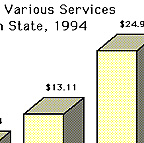 Exhibit C.
Exhibit C.These days, most people who have young children or work with them will admit that the U.S. child-care system leaves a lot to be desired. Currently there is no one "system" and parents struggle to find a program they can afford, while teachers and providers struggle for fair compensation for their knowledge of child development and extensive nurturing skills. The crisis is magnified by the increasing numbers of working mothers. According to the U.S. Department of Labor, sixty percent of the U.S. workforce are women, and 70 percent of those women are working mothers.
Census Bureau statistics show that child-care teachers are the most underpaid workers in the country. The median weekly wages for child-care teachers and providers in 1994 was $150. Early childhood care workers make significantly less than the people who take care of our cars.
Early childhood teachers in Oakland, California began in 1977 to mobilize around issues of their low wages, and the lack of respect shown to them. The Child Care Employee Project grew into a nationwide center, The National Center for the Early Childhood Workforce (NCECW), that is now in the fifth year of a campaign to raise awareness of the costs of high staff turnover. The turnover rate in child-care centers has been as high as 41 percent nationally, and studies show that children's language and social development suffer when turnover is high. Parents pay some of the hidden costs of child care when they are the ones who have to help smooth the transition between old and new caregivers.
They also spend large percentages of their salaries on child-care tuition. According to a recent report by Washington Kids Count, in this state the cost of child care in centers ranges from $330 a month for school age kids to almost $1000 a month for infants. The report also notes that "infant care costs 20 percent of average take home pay for married couples and two-thirds for single mothers." (emphasis added)
Child-care workers and providers are also active locally. A key element in the initial local public awareness campaign was the 1991 decision by Seattle area directors and teachers to close their centers for a day in a symbolic strike, and to create a time for solidarity and strategizing. As many as forty centers regularly join the yearly Worthy Wage Day gathering, which now exists as more of an occasion for networking and problem solving than as a wildcat strike. Parents and parent boards are increasingly supportive of Worthy Wage Day activities, and have joined the struggle to help educate and gain support from business and government.
Good for Kids, Good for Business
Society as a whole also pays many of the hidden costs of our inefficient child-care system. According to the NCECW, it is estimated that American businesses are losing $3 billion a year as a direct result of absenteeism due to child-care problems. The Washington State Child Care Coordinating Committee reports, however, that out of every $1 a company puts toward a family-friendly program, they save three to six dollars due to increased ability to attract employees, lower absenteeism, lower turnover, improved employee and public relations, and increased productivity.
Businesses have been taking more steps to support and sponsor child care, but the efforts have been spotty and sporadic. In Seattle, the Business and Child Care Partnership, established by the Mayor's Child Care Staffing Task Force, has been one of the recent successful starts. Wages have increased by as much as a dollar an hour in four of the centers involved in the project, which matches centers with corporate donors who give surplus goods and in-kind services.
Achieving fairness in the child-care industry also requires action by government. In most professions wages are closely tied to education, but while many of Washington State's early childhood educators have formal training in their field, current state laws do not require such training in most private programs. This creates a disincentive to hire higher salaried employees, and also means that kids are often taught by less qualified instructors. Efforts by early childhood care teachers and advocates to pass two state bills establishing a career development plan and a wage proposal for early childhood teachers have resulted in an increased awareness of child-care issues among state legislators. This proposed career development plan would give current teachers credit for their years of experience and help them gain public recognition (and eventually comparable worth) for their expertise.
The Seattle Worthy Wage Task Force's Worthy Wage Day on May 1, 1996 will focus on the ways in which business, government at all levels, early childhood teachers and providers, directors, and parents can work together toward raising teacher and provider wages while keeping parent fees reasonable. To this end the Task Force is inviting speakers from all of the groups mentioned above, and will be holding workshops with representatives from each of the groups. You are invited to join the May 1st celebration. As early childhood teacher and author Bev Boss says, "It is the obligation of all people to do what is right for children."
 |
 |
 |
 |
 |